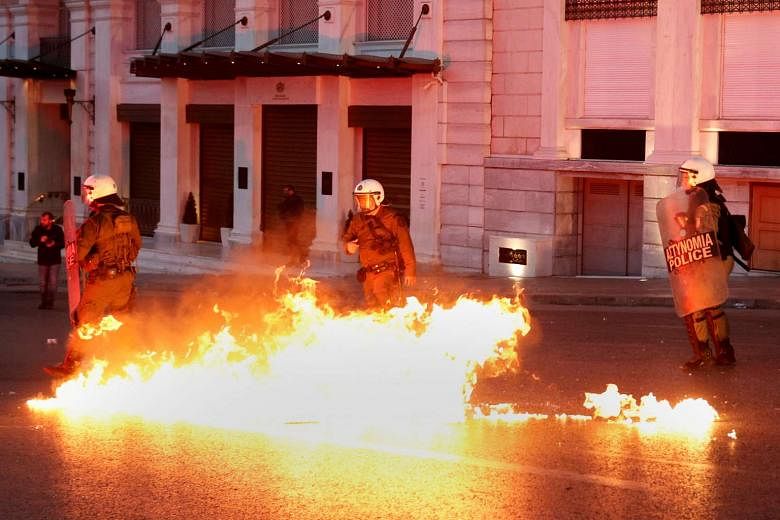ATHENS - Greek riot police on Sunday fired tear gas to disperse demonstrators who threw Molotov cocktails during an anti-austerity protest outside parliament in Athens, as lawmakers prepared to vote on a controversial tax and pensions overhaul.
Greek television showed police firing volleys of tear gas in response to projectiles lobbed by masked youths during the demonstration, which attracted around 10,000 people angered by the latest measures demanded by Greece's creditors.
The tensions come as Greece is in the grip of the third day of a general strike that has paralysed public transport across the country.
Thousands of protesters also took to the streets of Greece's second city of Thessaloniki to show their opposition to the proposed reforms, including many supporters of the communist-leaning PAME trade union.
The reforms to be voted on by MPs later Sunday would reduce Greece's highest pension payouts, merge several pension funds, increase contributions and raise taxes for those on medium and high incomes.
The measures are part of an austerity package demanded by the European Union and International Monetary Fund in exchange for the next tranche of Greece's 86 billion euro (S$133.4 billion) bailout agreed in July, the third for the debt-laden country since 2010.
Central Athens was largely closed to traffic with riot police vehicles parked in front of the parliament ahead of the vote.
Elsewhere in the city, there was a strong police presence although numbers were significantly down on February protests when 40,000 people marched in Athens alone.
"People are tired and disappointed by the leftist government in power... the rallies have not had the scale we had expected," said Maria, a private sector employee in her fifties who claims to be owed 30,000 euros in back pay from her employer.
She also blamed the Orthodox Easter holidays for reducing the numbers at the protests.
Prime Minister Alexis Tsipras defended the reforms on Friday, telling lawmakers from his left-wing Syriza party - which holds a slim majority with 153 seats in the 300-seat parliament - that they would spare the poorest.
Reforming Greece's bloated pension system is crucial to prevent "the system collapsing in a few years", Tsipras added.
Finance Minister Euclid Tsakalotos has called on the eurozone to back the reforms, warning of a "failed state" if the Brussels talks run aground.
"The elements for closing the first review and providing debt relief are, I firmly believe, all there," according to a letter to the euro area's finance chiefs seen by AFP.
"Nobody should believe that another Greek crisis, leading perhaps to another failed state in the region, could be beneficial to anyone."
Greece's budget deficit has ballooned as it struggles to keep up with mammoth debt payments, which the IMF believes is unsustainable.
In its official agenda for Monday's meeting, the Eurogroup said it would review the "progress achieved" by Greece as well as discussing "possible debt relief measures".
Greece is in the grip of the third day of a strikes that have paralysed public transport across the country.
During the stoppages, the fourth general strike since Tsipras came to office in January 2015, the public sector has operated at a snail's pace, while most TV and radio stations have refused to air news bulletins.
Despite the pressure from the strikes, Employment Minister Georgios Katrougalos stood by the pension overhaul, pointing to a funding shortfall of two billion euros.
"This reform should have been done decades ago," he said.
Ahead of the Brussels meeting, differences between the creditors themselves have emerged over extra reforms demanded by the IMF that could amount to another 3.6 billion euros of cuts by Greece.
IMF chief Christine Lagarde has warned that there were "significant gaps" in Greece's reform offers, while European Commission head Jean-Claude Juncker said Athens had "basically achieved" the objective of the measures required by creditors.
But both the EU and the IMF have agreed that debt relief could be considered.

